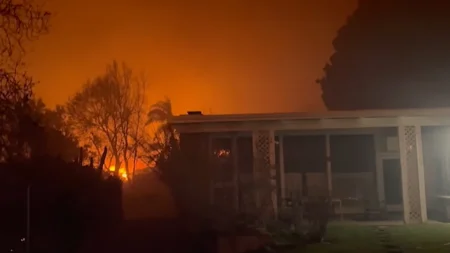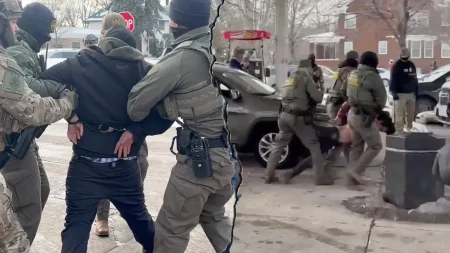Tragic Incident in Chicago: Migrant Teens Charged in Fatal Stabbing of Homeless Man
In a deeply disturbing incident that unfolded in Chicago’s Loop area early Sunday morning, three migrant teenagers were charged in connection with the fatal stabbing of a 49-year-old homeless man. The case has sparked concern about youth violence and highlighted the challenges faced by both the homeless population and young migrants in urban centers. Sixteen-year-old Wuinayker Rodriguez-Vasquez now faces adult charges of first-degree murder, while two 14-year-old accomplices have been charged in juvenile court with first-degree murder and armed robbery, respectively. Court proceedings have already begun, with Rodriguez-Vasquez ordered to be held pre-trial after his detention hearing, and the younger teens similarly remanded into custody following their juvenile court appearances. Officials emphasized that the victim had no prior connection to his alleged attackers, making the seemingly random nature of the violence all the more troubling.
The tragic incident occurred around 5:45 a.m. on Sunday while the homeless man was sleeping near his belongings, including his pet cat and a skeleton mask. According to prosecutors, surveillance footage captured the teenagers approaching the victim with concealed weapons—Rodriguez-Vasquez allegedly hiding a knife in his sleeve while another teen carried a metal rod. The confrontation began when one of the teenagers grabbed the victim’s skeleton mask and fled with it. When the homeless man stood up, presumably to retrieve his stolen property, the situation quickly escalated into violence. Rodriguez-Vasquez allegedly kicked the victim, one of the younger teens struck him, and then Rodriguez-Vasquez reportedly stabbed him in the back, causing the man to collapse. Emergency services transported the victim to a hospital, but he was pronounced dead shortly thereafter, with the medical examiner determining the cause of death to be the stab wound and ruling it a homicide.
Law enforcement was able to identify the suspects through surveillance footage, eventually detaining teenagers wearing clothing that matched what was seen in the video. When apprehended, Rodriguez-Vasquez was found in possession of a knife, and he was later positively identified by his mother and another member of the group involved in the incident. Particularly disturbing details emerged from the aftermath, with prosecutors stating that Rodriguez-Vasquez was captured in surveillance images “displaying a knife to the group, making stabbing motions, and wearing the victim’s skeleton mask on his head.” A Chicago police source characterized the attack as “especially heinous and cruel,” describing it as “mob style” and noting that some of the suspects were seen laughing following the violent encounter, suggesting a troubling lack of remorse for their actions.
Background information about the suspects revealed that all three teenagers reportedly came from Venezuela, with Department of Homeland Security records indicating that Rodriguez-Vasquez is believed to have crossed into the United States in September 2023 near Eagle Pass, Texas, accompanied by his mother. He was arrested at that time but subsequently released, with Assistant State’s Attorney Todd Kleist noting in court filings that Rodriguez-Vasquez’s contact with Texas law enforcement was documented as an “alien inadmissibility” case. The prosecutor also mentioned that the 16-year-old has no prior criminal history in Illinois, suggesting this may have been his first serious encounter with the law in his new location. The immigration status of the two younger teens was not specifically detailed in the available information.
This case emerges amid ongoing national debates about immigration policy, urban crime, and the welfare of vulnerable populations like the homeless. The seemingly random nature of the attack—targeting a sleeping homeless person who posed no threat—raises difficult questions about youth violence and the factors that might drive such behavior. At the same time, the involvement of migrant teenagers in such a serious crime risks fueling negative stereotypes about immigrants, even though research consistently shows that immigrants are generally less likely to commit crimes than native-born citizens. The tragedy highlights the complex intersection of multiple social issues: youth development and supervision, the challenges faced by recent migrants attempting to integrate into new communities, and the persistent vulnerability of homeless individuals who often lack safe spaces to exist.
The court proceedings are likely to continue for some time as the justice system determines appropriate consequences for the accused teens. For Rodriguez-Vasquez, being charged as an adult means he faces the possibility of significant prison time if convicted of first-degree murder. The two 14-year-olds, processed through the juvenile justice system, will likely face different approaches focused more on rehabilitation, though the severity of the charges still ensures serious consequences. Meanwhile, the community must grapple with the loss of a vulnerable member whose life was cut short through an apparently senseless act of violence. As debates about public safety, immigration, and homelessness continue in Chicago and nationwide, this case serves as a sobering reminder of how these policy discussions translate into real human impact, affecting individuals whose stories and struggles often remain untold until tragedy brings them into public view.












